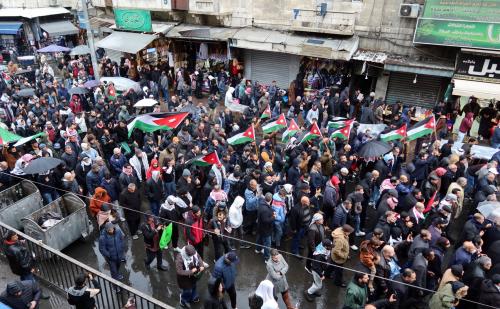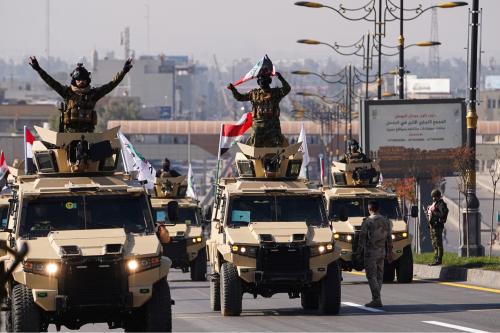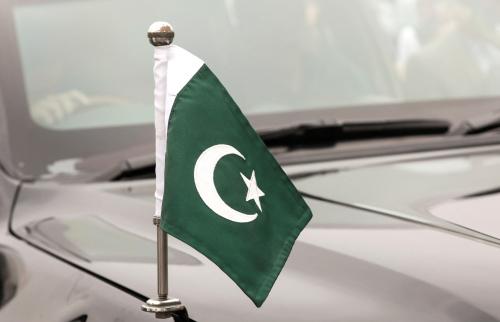If the last half of the twentieth century was the hour of the big man in Arab politics and the first decade of the twenty-first was the hour of the extremist, we are now witnessing on the streets of Cairo – to steal a phrase from the late Lord Ralf Dahrendorf – the hour of the citizen. Three waves of democratization have swept the globe in modern history, it has been argued, and each has bypassed entirely the Arab world. With the sudden collapse of authoritarianism in Tunisia and Hosni Mubarak’s regime teetering on the brink, a fourth such wave may be taking shape, with the Arab world at its epicenter.
It’s worth pondering what a fourth wave of democratization might look like, drawing upon what happened two decades ago in the former East bloc:
First, it’s unlikely that the autocracies of the Arab world will all topple quickly like dominoes as we saw in Eastern Europe. Protest movements will undoubtedly emerge in other Arab countries, other regimes may fall, but many Arab authoritarian governments are likely to be with us for a while longer. The communist regimes of Eastern Europe were all propped up artificially by Soviet military power; when it became apparent that Gorbachev was unwilling to intervene any longer in their internal affairs, these regimes collapsed quickly in the face of popular protests. Oil and natural gas have been the props supporting a number of Arab regimes (though it’s been American aid in the case of Egypt and Jordan), and these natural resources and the wealth they generate are unlikely to disappear anytime soon. Moreover, while the states of the Arab world share a common language and history and many cultural characteristics, they differ importantly in the nature of their regimes, the degree to which they have been open in the past to the outside world, the level of education of their citizens, and the strength of their civic institutions. What has happened in recent weeks in Egypt, the most populous Arab state, will embolden ordinary citizens throughout the region to make their voices heard, but most probably with varying results because of these very differences.
Second, political change will come in many forms, not just street protests. The events of recent weeks have put Arab leaders on notice. Many will now take steps to forestall any possible political unrest. We have seen this already in Jordan, where King Abdullah announced a new government in an effort to preempt the growing protests in his own country. Some of these changes are likely to be genuine, responding to the changed power dynamic in the region, and some merely cosmetic (as we saw in many of the successor states of the former Soviet Union) – changes meant to simply distract or buy time in the hopes that the public fever for change will eventually dissipate.
Third, political change will not always mean democracy. The Obama administration has been justified in its concerns about the rapid collapse of authority in Tunisia and Egypt. It will likely be a long and perilous road from the political openings we have seen in the last weeks to genuine democracy. Caretaker governments will have to be formed, constitutions rewritten, free and fair elections held, and new democratic political institutions crafted. These new institutions will be but paper creations if publics do not remain constructively engaged so as to ensure they function according to the will of the people. As the experience in Eastern Europe and the former Soviet Union shows, there will be many opportunities during this extended transition process for former regime insiders, extremists, political opportunists, and even criminal elements to co-opt these popular revolutions for their own purposes. Of the 28 countries in the former Soviet sphere, only 13 are today categorized by Freedom House as “free” and another 8 “partly free”. As with the former East bloc, the nature of each society will matter significantly in terms of which Arab countries succeed in making the transition to democracy and which do not. Well-educated, highly networked societies that have been relatively open to the world are likely to fare better than others.
Fourth, the political battles ahead in these societies are likely to revolve more around bread-and-butter issues than around ideology, but unlike in the former East bloc, the role of religion is likely to be a hotly contested issue. What has been most striking about the protests in Tunisia and Egypt is their non-ideological character. The protesters have had very simple and pragmatic demands focused on ending dictatorship and the corruption that accompanied it and improving basic rights and material living standards. To the extent their cries have verged on the ideological, it is greater freedom and democracy, and not Islam, that they have been calling for as way out of their current woes. For years, many western commentators have asked, often unfairly, where are the moderates? Well, here they are, marching peacefully in numbers larger than had ever been seen in the Arab world. In Egypt, the Muslim Brotherhood was late to the party, joining the demonstrations in large numbers only on the fifth day of the protests. More importantly, they do not appear keen on swiping the entire punch bowl for themselves. Nonetheless, there are likely to be heated debates ahead over the proper role of religion in public life, which remains an unresolved question in the Arab world. Better this battle be waged peacefully, though, within the context of democratic institutions, than violently on the streets.
Fifth, the collapse of authoritarian regimes in Tunisia and Egypt may well bring about a fundamental shift in geopolitics, akin to the realignments occasioned by the fall of the Berlin Wall, and the attacks of 9/11. Already we have gotten a foretaste of this in the shift in world media coverage over the last weeks –- from covering suicide attacks by extremists in Afghanistan and Pakistan to the protests of ordinary citizens in Tunisia and Egypt. For the foreseeable future, the energies and attentions of the United States and other major powers are likely to be consumed by political change in the Middle East. They will find themselves scrambling to keep up with the heightened expectations of newly empowered Arab publics – cajoling existing political leaders to get ahead of the curve by implementing meaningful reforms, managing peaceful political transitions, helping craft democratic political institutions and, above all, seeking to ensure stability as citizens clamor for regimes whose legitimacy derives not from force but from the will of the people.
Finally, a fourth wave of democratization could potentially spread well beyond the Arab world. It is conceivable the scenes from Tunis and Cairo could eventually serve as a rallying cry for a reenergized Green Movement in Iran. Chinese dissidents might find inspiration to challenge more aggressively the political monopoly of the communist party. And with presidential elections looming in Russia in 2012, democracy could perhaps have another chance there.
These could indeed be interesting, if perilous, times ahead.
The Brookings Institution is committed to quality, independence, and impact.
We are supported by a diverse array of funders. In line with our values and policies, each Brookings publication represents the sole views of its author(s).



Commentary
Op-edStarting in Egypt: The Fourth Wave of Democratization?
February 10, 2011